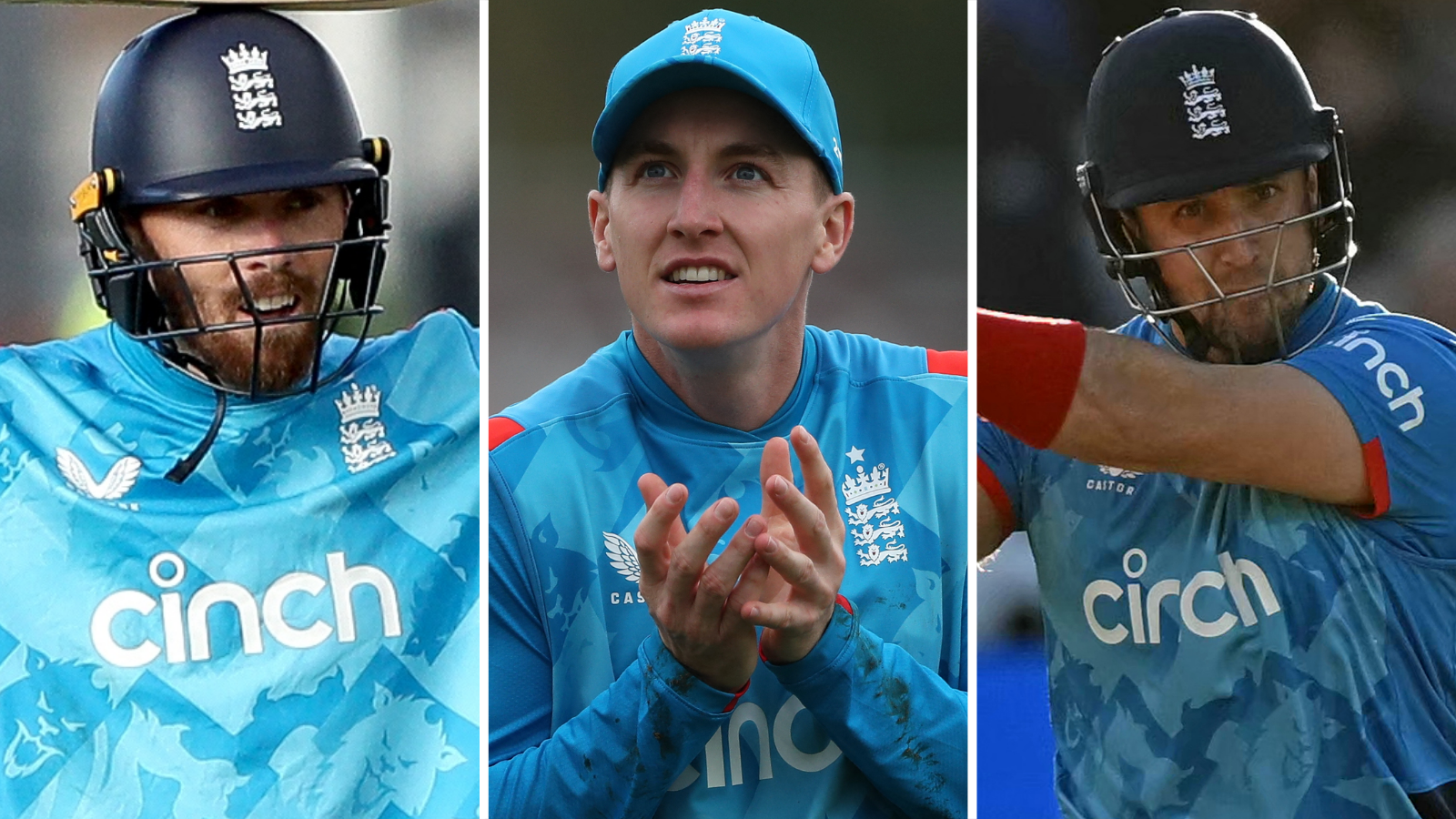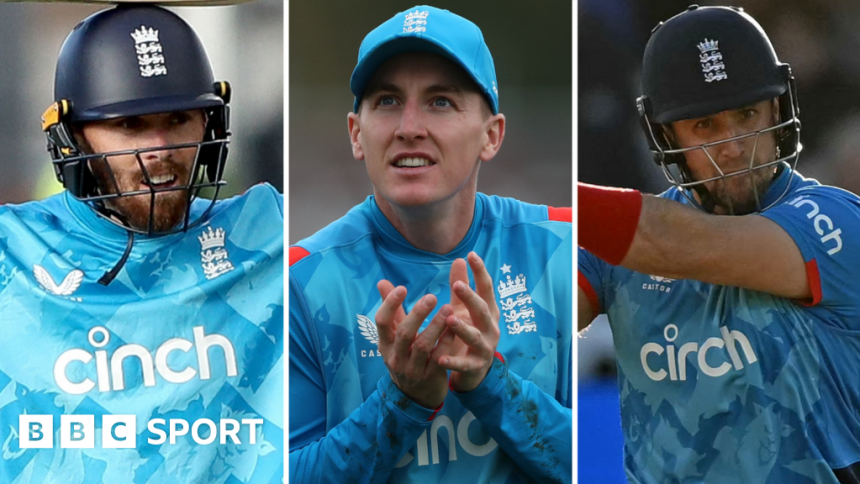The five issues facing McCullum as England’s white-ball coach

Phil Salt (left), Harry Brook (centre) and Liam Livingstone (right) will be questions for Brendon McCullum to answer
-
Published
English cricket loves nothing more than a reset.
There was one in 2015 after the World Cup debacle, another under Brendon McCullum and now their latest version – an attempt to resurrect a logjammed white-ball outfit.
This one, unlike the previous two, has begun with defeat. Despite fighting back to force a decider, England lost the fifth one-day international in Bristol on Sunday to give Australia a 3-2 series win.
The result is both positives and questions for England and McCullum, who will take over as white-ball coach in the new year…
-
-
Published4 hours ago
-
-
-
Published6 June
-
Brook proves himself another option to Buttler
England’s Brook gets first ODI century
Whenever Jos Buttler’s future as England’s white-ball captain is discussed it is met with a regular response, namely, there is no other option.
In this series, even if in defeat, Harry Brook has shown himself a capable alternative for whenever Buttler moves aside.
A change is not likely to come soon. “Very” was McCullum’s response when asked how confident he was Buttler, who missed this series with a calf injury, is the right man to lead going forward.
The pair are also close friends.
Brook received heavy criticism from fans for his “who cares” comments after defeat in the first ODI in Nottingham. He is not the first England captain to have his words condemned and will likely choose them more carefully in the future.
But he blocked out the noise to guide his side to victory with an unbeaten century in the third ODI in Chester-le-Street and calmly explained those comments were misunderstood afterwards.
There were tactical plusses too, most notably the canny and unusual straight fielding position to dismiss Cameron Green at the Riverside and the decision to front-load his seamers under the lights at Lord’s to knock over Australia. Best of all his runs – 312 in the series at an average of 78 – suggest he can balance the job with his batting.
Brook’s first foray into captaincy was a positive one.
Familiar questions await on Root and Stokes
Buttler is one of four 2019 World Cup winners who missed this series through injury or rotation as England looked to the future with a youthful and inexperienced squad.
He will return, as should Joe Root who will hopefully offer the stability missing from England’s batting during their collapses in the first and last ODIs in particular.
Another is Ben Stokes, who has not played a white-ball international since England’s dismal defence of the 50-over World Cup last year but has said he is open to a comeback under McCullum.
His upside is obvious. Stokes is England’s talisman, their 2019 World Cup hero and hit England’s highest ODI score just last year. He would also provide a much-needed fourth seam bowling option to the attack.
But a return to 33-year-old Stokes and Root would risk repeating the mistakes of their Indian implosion.
Root, who turns 34 in December, played just 13 of 33 ODIs from the end of 2020 to England’s World Cup opener while Stokes played the same number from 2019 to his first game in India, where England hoped 50-over form would seamlessly return only to be proved wrong.
If Root and Stokes, both crucial for a huge 15 months to come for the Test side, are to be part of the white-ball team building towards the 2027 World Cup, they must be regular fixtures along the way.
Who are England’s openers going forward?
Seven-ball duck for Salt
A decision on Root and Stokes will not have to be taken until the new year, given England’s next white-ball assignment comes between Test tours of Pakistan and New Zealand.
But if they are to return in India after Christmas, space will have to be made.
Opener Phil Salt looks the most vulnerable after returning just 95 runs in five innings against Australia. Across the series he faced exactly 100 balls and played 43 false shots.
Salt making way would allow Will Jacks to move up to open, who in turn could be replaced by Root at his traditional position at number three. Jacks has kept that slot warm effectively, with two half-centuries in the series.
Lower down, Buttler will return in place of Jamie Smith – another who will now return to the Test side.
England and McCullum have made no secret of their admiration for the Surrey wicketkeeper but retaining him in the near future does not look straightforward.
One solution, if alternative, would be to make Smith opener and add to those comparisons have been made with Australia great Adam Gilchrist. That would also provide the option of Buttler giving up the gloves to concentrate on captaincy.
Reuniting Ben Duckett, who nailed down one opener’s place with a century in Bristol, with Test batting partner Zak Crawley would be a more conventional solution.
Livingstone still has an ODI future
‘What an over’ – Livingstone hits Starc for 28 off the final over
Few England players puzzle more than Liam Livingstone.
On his day – like when thrashing 62 not out at Lord’s or 33 unbeaten at Chester-le-Street – his selection looks a no-brainer. The two ducks either side of those innings sum up a player consistent in his inconsistency.
A returning Stokes would squeeze one of Livingstone or 20-year-old Jacob Bethell out of England’s strongest XI.
Bethell, who like Livingstone provides useful spin, may be the future but at this stage Livingstone, originally dropped for this series but recalled after a strong performance in the T20s, still looks the more likely match-winner.
There were flickers from Warwickshire all-rounder Bethell – the highlights 44 in the second T20 in Cardiff and a reverse sweep for six off Adam Zampa at Lord’s. He did, however, struggle to turn over the strike at times, scoring his 85 runs in the 50-over series at a strike-rate of 73.91.
Further opportunities should come when England play West Indies in three ODIs and five T20s from 31 October.
-
-
Published13 September
-
Spin worries continue
Duckett goes six and out
But while McCullum will have selection decisions to make, his biggest challenge may well be one that has dogged England cricket teams for years.
A collapse of 8-102 in the first ODI was followed by another eight wickets lost for 107 runs in the fifth. What united them was on both occasions all eight fell against spin.
Across the series England averaged 47.62 against pace and 24.43 against Australia’s tweakers.
They played Adam Zampa, the world’s highest-ranked ODI leg-spinner, well for much of the contest, only to hand part-timers Marnus Labuschagne and Travis Head returns of 3-39 and 4-28 respectively.
Root return will help but with the slow turners of the Caribbean, spinning tracks of India and a Champions Trophy in Pakistan (as it stands) to come, that must be improve if this reset is to be more than a quick turn-it-off-and-on-again.






